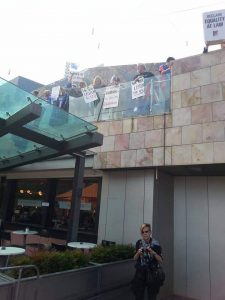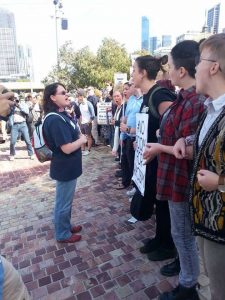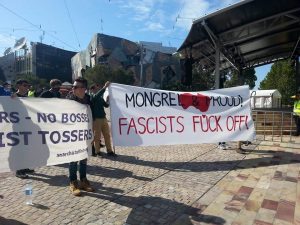On 4 June 2015 the AJDS held a panel on racism at Temple Beth Israel. With increasing expressions of racism in recent years, from the forced closures of Aboriginal communities in Western Australia, continual policing of Australian borders and the violence entangled in the structure of detention centres, the rise of Islamophobia and antisemitism, and the development of more extreme right wing fascist elements both within political platforms and on the streets, the AJDS executive felt it was important to have discussions on racism and to tackle these issues.
Listen to the panel on mixcloud.
The panel featured Linda Briskman, Professor of human rights and long standing AJDS member; Samia Khatun, historian of colonised peoples and author on Australian race relations; Crystal McKinnon, Amangu woman researching Indigenous resistance to oppression through the use of creative arts; Micaela Sahhar, Australian-Palestinian writer, poet and researcher on Israeli national narratives and its impact; and Mohamad Tabbaa, PhD candidate in Criminology and Law who has worked within the Muslim community in Melbourne.
The speakers held a conversation around a series of questions, talking through the causes of racism, the inter-connectivity and structural aspects of different forms of racism, as well as the unique aspects of racism in Australia. They pondered the foremost question on many of our minds: what can we do to combat it? The event was felt to be a great success, with wonderful and intelligent speakers, thought-provoking engagement with the audience and a great turnout of people from various communities. The panellists did a fantastic job of discussing their experiences and histories and drawing these facets together to provide a narrative of what racism in Australia looks like and what its causes are. Reflecting on the question of how we can continue to work to combat racism and the amazing insights offered by the experiences of each of the panelists, there was a feeling that the panel should not be an isolated event, but instead form a step in an ongoing dialogue about racism in its various forms.
It is crucial to keep these conversations going. Have them with friends, with family, write about them, challenge each other, get involved in specific campaigns that combat racism. To this end, this article aims to take the panel as a starting point and continue to examine aspects that were limited for lack of time and other factors beyond our control. No names are mentioned here, even though reference is made to various opinions aired by individuals. Included are just a few points from a discussion that covered and brought together many stories, understandings and solutions.
One of the themes that was echoed by panelists was the impacts of settler colonialism, drawing attention to the way that various forms of racism are linked. The point was made that racism is so ingrained in the foundations of Australia that it is sometimes taken for granted. While there was some talk about Australian multiculturalism, perhaps a greater emphasis could have been put on the way that the Australian narrative around being a multicultural society obfuscates the presence of deeply entrenched racism, and other ways in which racism in Australia has particular expressions.
As an AJDS organised event, one thing that felt absent to some was more discussion about anti-semitism and the uniquely Jewish experiences of racism. Whilst there is some contention about surveys done on anti-semitism in Australia and globally, it is obviously a reality in Australia. We have seen increased anti-semitic incidents in reaction to Israeli military interventions, and the morphing of these issues, whereby responses to the actions of Israel are wrongly targeted at Jews, in addition to some members of the Jewish community lumping together all Palestinian solidarity with anti-semitism. This creates a tense climate which inhibits the capacity to tease apart the issues of Israel/Palestine and anti-semitism.
Another issue that touches on anti-smetisim is the existence of a common narrative of racism, one which categorises people of colour versus white people. The act of doing this, while useful to understand and deconstruct whiteness and structural racism, may also serve to lump together the differing experiences of racism, for example by Aboriginal people and people of various geographical descents, all of whom may be subject to unique racist attacks. Furthermore, categorisation of people by their skin colour can make invisible those that are subject to racism based on their culture, ethnicity, religion or indigeneity, but ‘appear to be white.’ The common reference we hear to ‘a sea of white people’ that inhabit political spaces and demonstrations is one example of this. This ‘sea of white people’ assumes the identity of those present to be white, and assumes that people who appear white have not been subject to institutional and/or personal racism.
One of the panelists brought up the way that class intersects with race and impacts on power dynamics in responding to questions around the ways in which we can forge lateral relationships and work together on tackling racism. In various discussions following the panel, the issue of class has come up as something that is often overlooked. The intersection of race and class came to mind when one of the audience members remarked that despite overwhelming community support, they often find that it failed to connect with to a great deal of people in those communities. It might be useful to further examine class, for example, in the use of academic language when speaking about racism and the spaces we inhabit when we discuss this aspect of our culture.
In tackling the ways in which we can work against racism, panelists talked about the difference between allies and partnerships, the relevance of addressing political leadership, the normalisation of inequality and the ways in which people get actively engaged when they are stimulated to make an emotional connection to the issue. Another important point was made about the spaces where activism and tackling racism takes place. An example was given of a fundraiser for Muslims being held in a pub, which alienated members of the Muslim community and prevented many from attending. Various speakers commented on the work that needs to be done in their own communities.
These are specific actions and objectives that we can undertake when we feel like anti-racist work is overwhelming, or when we feel unsure where to start or what to do. The AJDS held this panel in order to facilitate a group of people who have experienced racism and have tried to challenge it, and to share their insights. We are very grateful to each of the speakers, all of whom offered unique perspectives and narratives. The AJDS is committed to ongoing dialogue and standing up to racism in all its forms, and we encourage all of our supporters to do the same.
Read Mohamad Tabbaa’s reflections on the panel here.
Please feel free to respond, contribute, critique. Write to us at the AJDS.



